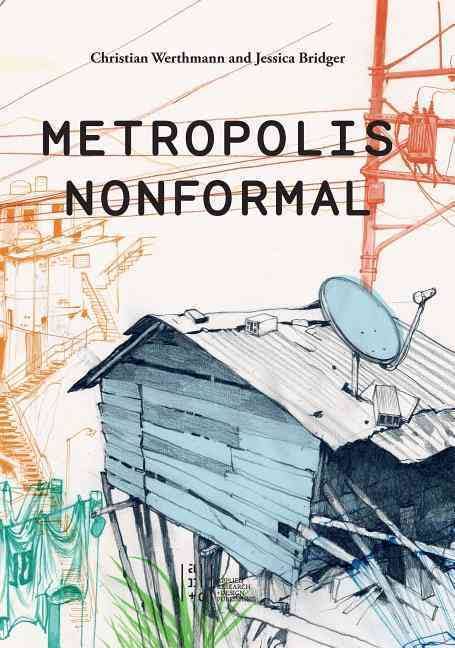Christian Werthmann and Jessica Bridger
Applied Research + Design Publishing, 2016

Christian Werthmann and Jessica Bridger’s recent book invites us to look at, think about, design, and act upon nonformal processes of human territorial occupation in new and creative ways. It is a crafted synthesis of lectures, presentations from conferences and seminars, articles, research, academic explorations, professional practices, and interviews revealing the diversity of challenges, achievements, and pending questions concerning the construction of nonconventional social landscapes. Participants provide concise insights in relation to their theoretic framework, and/or findings, projects, and programs, as well as new quests to be pursued. This simple structure allows us to grasp the diversity of conditions and approaches that fall under the umbrella of the Nonformal. At the end of this publication, the contributors were all asked to answer the same four personal questions in relation to what motivated them to become interested and engage in this thematic, as well as providing advice on new paths to follow to meet emerging challenges.
Thus, this publication is meaningful since it addresses a myriad of spatial occupation and social performance issues; multiple sensitive approaches that seek to enhance the dynamic and flexible attributes of the nonformal settlements, and to provide them with satisfactory and resilient conditions. These different readings allow us to better understand that, due to the magnitude of global self-constructed urbanization, far from being an anomaly, informality represents the new normal. This is particularly important in an era of explosive population growth, much of which is occurring in the form of very large urban-territorial systems, accompanied by unprecedented environmental stresses and social conflicts, all of which reveal the inadequacy of the conventional approaches that the political, institutional, academic, and professional optics have provided.
Consequently, the ideas contained here are not rebellious attacks on the conventional or romanticized visions of the nonformal; they should be considered an urgent call for action in new directions. They may improve living conditions not only for those who self-build their habitats, but also for those who live in formal settlements, with a strong belief that much can be achieved by blurring both conditions. This publication goes a step further than other publications exploring the topic of informal urbanization, which tend to be descriptive only of existing situations, including those authors fascinated by the virtuosity of the self-constructed neighborhoods and the resilient nature of these communities, or those that exalt its chaotic behavior and predict serious outcomes of inaction without offering any solutions.
Metropolis Nonformal lies in middle ground since it has been able to bring together a diverse group of contributors who think and act in a positive manner, offering precise thoughts, solutions, and results to achieve better and sustainable conditions. They share their personal and collective convictions to incite action. While the majority of the examples here intend to engage with existing nonformal settlements, they invite us to look into the future by calling for new explorations and actions, and by analogy, to envision new approaches to deal with emerging processes of nonconventional occupations. Forms of preemptive and transformative subtle support of nonformal incumbent occupations not only are urgently required but may also prove to be most effective in meeting these challenges.
Many authors in Metropolis Nonformal referred to these crucial considerations. However, much more has to be accomplished when dealing with preemptive unplanned or unconventional processes. When the authors in this book were asked to suggest new directions, answers, leading questions, and new solutions, they did not elaborate much on these topics. Furthermore, even in the contexts in which it is accepted that the existing nonformal requires attention, including in those cities that have successfully improved existing situations and thus have become examples to the world, there is still great resistance to accepting the validity of inducing and fostering new types of nonformal occupation, as if this was counterproductive and illegal.
While the title of this publication eludes to the Metropolis, a term usually used to describe very large and complex systems of territorial occupation, which includes different forms of urbanization, infrastructure, agricultural, and protected land, most case studies and interviews in the book focus on somewhat smaller-scale situations in which the nuances of place and culture can and must be carefully taken into account. One can argue that these examples reveal that acting upon the nonformal requires site-specific responses, in a myriad of directions, and above all, as the authors explain, engaging communities. However, perhaps a major challenge ahead is to balance such community-oriented responses with the more complex demands of the Metropolis (and the emergent Megalopolis), which will be predominantly fostered by the nonformal. This book provides exciting clues on how to do so.
How to Cite this Article: Gouverneur, David. Review of Metropolis Nonformal, by Christian Wethmann and Jessica Bridger. JAE Online. April 21, 2017. https://jaeonline.org/issue-article/metropolis-nonformal/.






